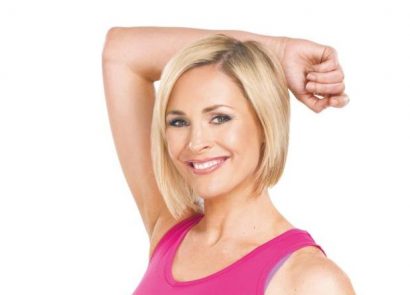-
“The slimmer you are, the less weight you’ll lose because you’ll be burning fewer calories,” says nutritionist Dr Sarah Schenker (sarahschenker.co.uk). “Recognise that weight loss works in steps so it will come off for a few weeks and then plateau and then take a few weeks before it starts falling again. The key is not to give up and to see it as a long-term plan.”
-
Take a tip from professional athletes and rather than focus on what you can’t do, have a vision of what you can achieve. “Visualisation training improves the mental process and reinforces good habits or enhances the current experience by building a stronger mindset,” says sport and exercise scientist John Beeby (johnbeebypt.com). “Athletes use this technique to create their own realities and through the power of their own thoughts and feelings overcome adversities and break though barriers.” If visualisation is not for you, try looking at the problem from a new perspective. “The scale may not have moved but your clothes may feel looser, you may be able to exercise longer or harder, or just have more stamina,” says nutritional therapist Shani Shaker. “Consider the impact weight loss is having on your health, as well as appearance – even the slightest loss will have a positive impact on blood sugar regulation, blood pressure and cholesterol levels.”
-
You might think you’re keeping a beady eye on your calorie intake and expenditure but it’s easy to underestimate how much you’re scoffing or overestimate a workout. “Diet lapses such as the odd glass of wine or a missed gym class can all cause a plateau,” says nutrition coach Susan Hart (nutrition-coach.co.uk). “Get back to basics and log your food and activity on an app and you should get back on track.” And focus on those portion sizes too. “Look on the packets, or find a good portion guide,” says dietitian Priya Tew (dietitianuk.co.uk). “Items such as nuts, dried fruit, pasta and cereals are easy to over-consume.”
-
If you find yourself in a routine rut, try completing your gym regime back-to-front to make it more interesting, or, if you always exercise after work, get up earlier and do it in the morning. Small changes can make a big difference to motivation levels and keep muscles guessing.
-
“There’s nothing like exercising with a friend for keeping you motivated,” says dietitian Renee McGregor (reneemcgregor.com). “Put the date in your diary just as you would a social meeting and this will help get you out the door.”
-
Pounding the treadmill in the same way every day, week in week out, is not only boring for you but your muscles too – as they become more efficient at an exercise, they’ll burn less calories. Up the intensity with heavier weights, try interval training, or get a PT to devise a new routine. “By using what is known as ‘periodisation’ in your training you’re going to give yourself the best opportunity to continually progress and develop,” says John Beeby. “Because the body adapts, your training cycles should be adjusted every six weeks, and depending on the type of goal you have, base your six week plan specifically around this goal.”
-
Consumed by workouts and weight loss, we can easily forget how far we’ve come. Give yourself a mini thumbs up every few weeks to spur you into action again. “Take two days off and then start a brand new fitness routine, buy some new kit, or watch some inspirational movies – if others can overcome adversity then you can overcome your plateau!” says Dr Rhona Cohen, sport and exercise psychologist at Middlesex University. “Set a reward for overcoming your plateau, such as a night out – and if you want it, you’ll work for it.”
-
“Pick exercise and activities that excite and encourage your likelihood of continuing,” says John Beeby. “Not all exercise suits everyone so make decisions based on what you love. Training isn’t exclusively in a gym but could include dancing, swimming or playing tennis.”
-
We’ve all done it – we go to the gym and work out for an hour, only to come home and watch Game of Thrones on repeat! To maintain your weight and fitness long term you need to include incidental exercise into your day, on top of your workouts. “Walk to the bus stop or park further away from your office,” suggests dietician Dr Schenker. “Take the stairs rather than the lift or stand in a waiting room rather than sit down – all these things add up.”
-
It might sound counterintuitive but if you want to get fit, you need to rest. Getting plenty of sleep and giving your muscles a recovery day is just as important as the number of reps you do. Have a day off each week and give yourself a full week of rest every six weeks. “Rest, re-fuel and be patient!” says Beeby. “It’s easy to push the body too hard and get frustrated when results aren’t achieved in two days. The reality is that true change takes time and short cuts remain just that!”
Show your inbox some love
Get a weekly digest of Health & Wellbeing emailed direct to you.


















